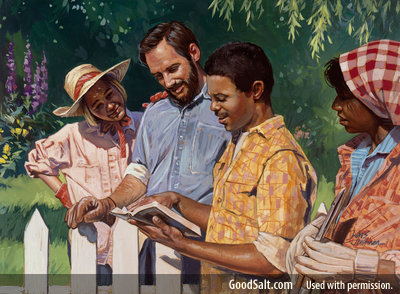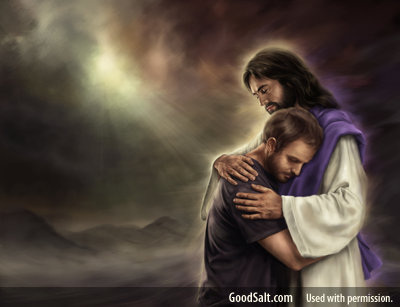“Jesus said to him, ‘I am the way, the truth, and the life. No one comes to the Father except through Me.’ ” John 14:6
We live in a world today that teaches there are many different ways to God. Many people insist that all religions lead to the same God (Universalism). Is this true? The God of the Bible has told us Himself that “besides Me there is no savior” (Isaiah 43:11). If God had said there are many ways to Himself, then, yes, there are many ways to Him. But He has not said that. He says that He alone is the “savior.”
In our verses today, the Lord Jesus Christ makes it very clear that He is the only way to God the Father in heaven. This is essential for us to understand if we are going to find peace under pressure. So far we have learned that we can find peace under pressure by focusing on Jesus’ promises of peace of heart, a prepared place in heaven, and His presence in heaven. The fourth and final way is to focuson Jesus’ PROMISE OF A PREPARED PATH TO HEAVEN (John 14:4-6) for those who believe in Him.
Christ makes it clear in response to Thomas’ question that for anyone to enjoy the prepared place in heaven, he must know the prepared path to heaven. “And where I go you know, and the way you know.” (John 14:4). Jesus affirms that the disciples “know” both “where” Jesus is going and “the way” to get there. Throughout His ministry Jesus had taught His disciples the way to heaven.
Now Peter had an answer to his question, “Lord, where are You going?” (John 13:36a). Christ was going to His Father’s house. Even though He must first go alone, He would return and take them to His Father’s House where they would be with Him forever. This seems to have satisfied Peter as he asked no further questions. But Thomas did not fully understand what Jesus was saying.
“Thomas said to Him, ‘Lord, we do not know where You are going, and how can we know the way?’ ” (John 14:5). Thomas did not understand Jesus’ reference to His Father’s House. Thomas renews the doubt about Jesus’ destination including the path that would take one there. Thomas was honest and uninhibited as he expresses his confusion. Jesus had said they could not come with Him at this time (John 13:33, 36b). How then can they know the way?
“Jesus said to him, ‘I am the way, the truth, and the life. No one comes to the Father except through Me.’ ” (John 14:6). Since Jesus is going to the Father’s House, He now makes it clear that He is “the way” to His Father’s home. Jesus did not rebuke Thomas for his lack of understanding and we must not either. We are to be gracious with those who may not see things as we do.
The Lord explains to Thomas, “I am the way” to My Father’s House. Jesus did not say He was “a way” to heaven, leaving open the possibility of other ways to heaven which is commonly taught today. There is only one “way” to heaven and that is through faith alone in Jesus Christ alone (John 3:5, 15-16; 10:9; Acts 4:12; I Timothy 2:3-5).
Many people today think there is more than one way to God. They are placing their trust in people or religions that will only lead to eternal destruction (cf. Matthew 7:13-23). Jesus warned His disciples that there are many “false prophets” (Matthew 7:15) who stand in front of the “broad… way” that “leads into destruction” (Matthew 7:13). These false prophets are dressed in “sheep’s clothing” (Matthew 7:15) and appear to be Christians.
But Jesus will refuse to let them into heaven because they were trusting in their confession of Jesus’ lordship (“Not everyone who says to Me, ‘Lord, Lord,’ ” – Matthew 7:21) and their works that they did in Jesus’ name for His glory (“Many will say to Me in that day, ‘Lord, Lord, have we not prophesied in Your name, cast out demons in Your name, and done many wonders in Your name?’” – Matthew 7:22). They were not permitted entrance into “the kingdom of heaven” because they failed to do “the will of” the “Father in heaven” (Matthew 7:21) which is believing in Christ alone for everlasting life: “And this is the will of Him who sent Me, that everyone who sees the Son and believes in Him may have everlasting life; and I will raise him up at the last day.” (John 6:40; cf. Matthew 18:3; 21:31-32).
Jesus said you may know these false prophets by “their fruits” (Matthew 7:16-20) which are their “words,” not their works (Matthew 12:33-37). Any teacher who says you can go to heaven through some other way than faith alone in Christ alone, is a false prophet and must be avoided (cf. I Timothy 6:3-5).
When Jesus said, “I am the truth,” He is referring to the truth about the Father. Even though the disciples may have felt strange going to His Father’s House because they had not met the Father, yet since they knew Jesus, they did know the Father as well because Jesus and the Father “are one” (John 10:30). To see and know Jesus was to know and see the Father because Jesus is the perfect reflection of the Father as God the Son (John 14:7-11; cf. 1:1; 12:44-45).
As “the truth,” we can believe in Christ’s promise of everlasting life to those who believe in Him (John 3:15-16; 36; 5:24; 6:40, 47; 11:25-26) because He never tells a lie. He is always faithful to keep His promises.
When Jesus said,“I am the life,” He was saying that He is the only Person who can provide “the life” or relationship (John 1:4, 12; 5:21; 17:3) that is needed to come to the Father’s House. Jesus claims that He is the exclusive way to the Father, “No one comes to the Father except through Me.” The path to heaven is a Person – Jesus Christ Himself. You can begin a personal relationship with Him simply by believing in Him alone for His free gift (John 3:15-16; 17:3).
Jesus’ claims in this verse are very personal. Jesus did not merely claim to know “the way, the truth, or the life” as if it is some formula to give to the ignorant. He claims to be “the way, the truth, and the life.”
One continuing concern about American tax structure is the problem of loopholes. Some people spend more time looking for loopholes than they do figuring how much tax they owe. Corporations hire experts to look for legal ways to avoid taxes – and they find them. The result for the U.S. government is the loss of millions of dollars – all because of loopholes.
Some people develop a “loophole mentality” in their relationship to God. For example, when comedian W. C. Fields (1880-1946) was on his deathbed, a visitor found him reading the Bible. Asked what he was doing, he replied, “Looking for loopholes, my friend. Looking for loopholes.” 1
The Bible says that Jesus is the only way to heaven, and that we must believe in Him alone as our Savior (John 3:15-16; 10:9; 14:6). But some people secretly feel that when they die and stand before the judgment seat they will find some other way to get in. They refuse to believe the Bible’s teaching that salvation is through Christ alone (John 3:5, 15-16; 14:6; Acts 4:12) and that eternal punishment awaits those who reject Christ (John 3:36; Revelation 20:15). They have convinced themselves that they will somehow escape the final judgment and its terrible consequences.
But they are wrong. Jesus is the only “way” to heaven. According to Jesus Christ, there are no other ways to God the Father. You may ask, “What right does Jesus have to make such an exclusive claim?” The Bible affirms that Jesus was “declared to be the Son of God with power… by the resurrection from the dead” (Romans 1:4). The proof that Jesus rose from the dead was that He was seen alive after His death by over five hundred eyewitnesses (I Corinthians 15:5-8).
The resurrection of Christ is the most attested fact of history. Thomas Arnold authored a three-volume history of Rome and was appointed to Oxford’s Chair of Modern History. Concerning the evidence behind the resurrection of Jesus Christ, he said, “I have been used for years to study the histories of other times, and to examine and weigh the evidence of those who have written about them, and I know of no one fact in the history of mankind which is proved by better and fuller evidence of every sort, to the understanding of a fair inquirer, than that Christ died and rose from the dead.” 2
The early followers of Jesus made it clear that “there is no other name under heaven given among men by which we must be saved” (Acts 4:12) other than Jesus Christ (cf. Acts 4:10-11). The Bible, God Himself, and His followers teach that there is only one way to God and that is through the Lord Jesus Christ. To believe or teach something else means you must deal with the authority of the Bible and the credibility of Jesus Christ. 3
If you have never understood and believed this, listen to what God says in Isaiah 45:22: “Look to Me, and be saved, all you ends of the earth! For I am God, and there is no other.” God the Son, Jesus Christ, now invites you to believe or trust in Him alone to save you from eternal death and give you His free gift of everlasting life. Jesus said, “I am the resurrection and the life. He who believes in Me, though he may die, he shall live. And whoever lives and believes in Me shall never die” (John 11:25-26). When you believed in Jesus, the Bible says you can “know” you have eternal life. “These things I have written to you who believe in the name of the Son of God, that you may know that you have eternal life.” (I John 5:13).
When you believe in Christ, He comes to live inside of you through His Holy Spirit (John 7:38-39; Romans 5:5; 8:9-11; I Corinthians 6:19; 12:13; Galatians 3:2; 4:6; Ephesians 1:13-14). Then you can begin to experience His promise of peace of heart and look forward to a prepared place in heaven where you can enjoy His presence forever unhindered by sin and shame. But it all begins when you realize and accept that the only way to heaven is through a Person – Jesus Christ Himself.
If you have never made the decision to believe in Christ alone for His gift of everlasting life, you can do so right now because there are no loopholes. You can simply tell God through prayer that you are now believing in His Son, Jesus Christ, as your only hope of heaven.
Prayer: Dear Jesus, I come to You now as a sinner who deserves to be separated from You forever. I now realize that You are the only way to heaven. You proved this through Your words and works, the greatest of which was when You died for the sins of the world and rose from the dead. Lord Jesus, I am now believing or trusting in You alone (not my religion, my prayers, or my good life) to give me everlasting life and a future home in heaven. Thank You for the everlasting life I now have and the future home I will have in heaven. In Your precious name I pray. Amen.
If you just believed in Jesus as your only hope of heaven, we would love to hear from you. Simply send a message to us through the “Contact Us” page. To grow in your new relationship with Jesus Christ, please explore this website or www.knowing-jesus.com. Thank you, and may Jesus richly bless you.
ENDNOTES:
1. See Our Daily Bread, October 5, 2002 – https://odb.org/2002/10/05/looking-for-loopholes/.
2. Arnold Thomas, Sermons on the Christian Life – Its Hopes, Its Fears, and Its Close, 6th ed. (London: T. Fellowes, 1859), pg. 324.
3. See EvanTell’s The Evangelism Study Bible (Grand Rapids: Kregel Publications, 2014), pg. 776.










